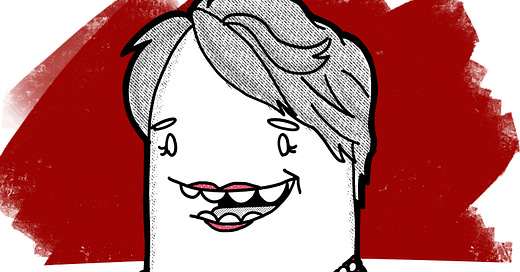TRANSCRIPT
Matt
Welcome back to Sound-Up Governance. We've talked a lot on the show lately about education for corporate directors. Well, today's guest Beverly Topping is one of the OGs of Canadian director education. She was the CEO of the Institute of Corporate Directors when it launched the Directors Education Program back in 2003. Today, there have been hundreds of offerings of the program and many thousands of graduates. Bev is also one of the few precious people in my life who's both cared about me and my career, and had higher expectations of me than I do of myself. In other words, a champion, a coach and a mentor. When I asked Bev how she'd like to be introduced, she just said, "Beverly Topping: an entrepreneur." Succinct, but entirely insufficient to give you the full picture. So here's at least part of the story.
Bev Topping
Well, when I started out, being an entrepreneur, it wasn't the trendy thing. Today, startups and being an entrepreneur is over glamorized compared to what it was, when I was starting out. In my day, it was assumed that you couldn't get a real job. So you'd start your own business. So that means number one, you have to accept as an entrepreneur, not necessarily fitting in.
Matt
And so where did it take you?
Bev Topping
I built a business called Today's Parent Group, we would be known in the consumer market in the marketing world as Today's Parent Magazine, that was one of our products. But we had at different times 15 different magazines. We educated and supported childbirth educators. If you had a baby in a hospital, we would deliver a sample pack to you. We would take your digital photograph of you and your baby. We basically surrounded the customer. We were in the database, data mining business before anybody knew what it was, I'd say 1983. It was one of our biggest assets from a business perspective. You have to understand I did not come from Toronto, and I did not come from the established publishing industry. I never really thought of us as publishers, because along with those 15 magazines at different times, we had the database business, the sampling fulfillment business. We had two television series. We had educational programs, as well as consumer programs. We tested the toy catalog business. We even at one point, looked at marketing to kids. And thankfully we figured out that that wasn't going to be our expertise. But for for a short while we had the North American license for the NHL, to market to kids. One of my proudest moments was being able to show my two sons that I had a business card with the NHL logo on it. Anyway, it was a business that we decided we didn't know enough about, so we should get out of it. And we did that quickly.
Matt
Pretty cool, right? Just building a successful business with a bunch of diverse products is interesting enough, but I promise you, that's not enough to give you a full sense of why Bev's so awesome. Trust me in that business at that time, this was a tough slog,
Bev Topping
You also have to understand that that market was not a sexy market in in the 80s. So we were just sort of discounted. Nobody took us too seriously, unless you were pregnant, or unless you were a parent. And I had heard a statistic at one point on CBC where there were more disposable diapers sold in the world than there were single cigarettes. Now, I can't verify that. But that was certainly an affirmation of we were we may not be in the sexy business, but we were in a business that was big enough that it could grow. And the publishing industry in Canada at that time, perceived itself to be pretty elite. So they had their own sort of closed doors. So once again, I didn't fit. We could never afford to hire established magazine people, editors or writers or even salespeople who had the relationships with the advertising agencies. So we really were starting from scratch. We couldn't afford to hire, the pay the salaries for those kinds of people, number one, number two, none of them would have wanted to work or none of them did want to work for a nobody startup. So as a result we hired people who had nothing to do with the publishing industry. And that I'm sure in part that was why I never thought of as being in the publishing industry. We were in business. We happened to have a niche and had some magazines as products but we would hire bartenders. The other interesting thingis when you're selling advertising, the advertising agencies are the the big, powerful people. And at a certain point, I had invited one of the advertising agency guys into our office for no other reason, so that he knew that we could afford to pay rent. And he made a comment in my office. And he was unique because he took a chance and came to see a nobody. One of my kids' bikes happened to be in my office, and we were on Richmond Street in an old Victorian house. So we were in non traditional office space. And I made a comment, "oh, that just means one of my kids has been around or is still around somewhere." And he got us a feel for what our office was like. And he said, "my sister has just graduated from commerce at Queen's. She's looking for a job. She's traveling right now." And I said, "Oh, that's lovely. Did she enjoy Queens?" And he said, "Yeah, but she also was the manager of the pub at Queens." I said, "Okay, now we're talking!" And he looked at me, and I said, "I'm more interested in her skills at managing a pub. Because that means she can deal with almost anything. She understands human behavior, and people. She's not afraid. The Commerce degree is a bonus, but it's not the number one priority." And I said, "track her down and tell her to come and see me." We hired her. We subsequently hired another commerce grad from Queens who worked at the pub.
Matt
I'm curious. You know, this, it seems like such a fun adventure and something that like was so well suited to you. What could have possibly made you want to leave?
Bev Topping
Oh, boredom. Short term, I have a short attention span, I have lots of energy. So we need to do things differently. The other really good thing was the team didn't need me, they could run the business. We put together in an eclectic group of people who all wanted to do something and they wanted to do something different. And so and they had fun. We made mistakes, we learned fast, we flew by the seat of our pants, I was the one who had more nerve than brains. But I had enough brains around me who I would listen to.
Matt
Now, I was just starting to be welcomed into the corporate governance world when Bev joined the ICD as CEO and it occurs to me now that especially at that time, there weren't a lot of big thinking fast moving entrepreneur types in the stuffy upper echelons of Canadian corporate boards. And very few women. How on earth did Bev find herself in the space?
Bev Topping
Okay, that's a really good question. Because we ended up raising venture capital and private equity money, the business world in Toronto got to know me. We'd never screwed anybody, we always and the person who used to help me be my front person to raise capital always referred to "Bev is actually only wants to rent your money, and you'll get your money back and all of the profits that go with it." And so basically, we did that. And we did it enough times that as I said, the financial world began to notice us. And then I took on a I wanted to buy some magazines from Maclean-Hunter who were the big publishers in the day. And they said, "no, go away. We we buy people like you." Anyway, I went through the back door of Maclean-Hunter and talked to some people on the inside and said, "You guys with these four magazines, you'd be better off in my stable than somebody else's." So they finally convinced themselves that they would take a minority position with me. So they gave up some assets, which they'd never done before and completely left us alone. Maclain-Hunter was taken over by Rogers. So again, we became known because all of a sudden, Rogers had a minority position in a in a business that was a partly publishing but it was also the data mining business. Based on that, having Rogers as a minority partner at a certain point, Rogers indicated that they were interested in buying the rest of the business, but they weren't interested in the database business, which was a big mistake on their part. So I turned around, because I was the majority shareholder, I sold the data side of the business, to a company in St. Louis. And part of that data sale involved the hospital new mother sampling pack. Which was a way of gathering more names. But it was also an additional business that integrated nicely in the data mining business, particularly the prenatal data mining business. People we also manage databases in Canada for people like Procter and Gamble, their Pampers. We came up with ideas on redemption programs for people like Shoppers Drug Mart, who have ended up developing the Optimum card. So again, that was a really important side of our business that was bigger and profitable. Even though our magazines were profitable, our other side of the businesses were were stronger. Anyway, I sold that side of the business and Ted Rogers thought I was God for a few moments.
Matt
Sorry, I'm going to interrupt Bev here for a moment. For any Canadians listening, this already might sound kind of almost unbelievable. Bev scooped some publications from Maclean-Hunter in exchange for a minority stake and Today's Parent. Yes, the Maclean-Hunter that started massive publications like Maclean's, Chatelaine, Financial Post and so on. Maclean-Hunter gets bought by Rogers Communications, which in turn passes on buying Bev's data mining operation, so she sells it to some US company. Meanwhile, Bev's company comes up with what ended up being one of the most influential and successful corporate loyalty programs in Canadian history. No wonder Ted Rogers thought she was God. Holy smokes. Sorry, back to Bev's story.
Bev Topping
Anyway, because of the entrepreneur experience, corporate Canada began to notice. And I got a call one day from a search firm asking me if I would consider coming forth as a candidate to go on to the board of one of the large financial institutions. And I just first of all, we never we always hired people in the weirdest places, as I said, bars. We never used search firms because then nobody ever called me I wasn't I didn't, I didn't know who the players were. I just knew that they existed, had no interest in them. So when I get this call from the search firm, asking me this, I start to laugh. And I said, "Well, you obviously have the wrong Beverly Topping." And the search firm said, "Why would you say that?" And I said, "Well, I'm an entrepreneur, and we hate banks!" And I ended up going onto the Board of Canada Trust and I may have been 40. But it was early 40. I knew nobody. I didn't. I did not like boards. The only time I was exposed to a board was if I had to have a representative from the venture capital or private equity guys on my board who would tell me what to do. And of course, I didn't want to listen to them anyway. So this was completely foreign. I, my pedigree was nothing even close to the pedigree of the people on that Canada Trust Board. In those days. We had people like David Johnston, the Governor General, Purdy Crawford, Rudy Bratty, Sonja Bata, I mean, this was the elite. And of course, I knew none of them. They had a goal of being the best in the consumer side of the business. So they used me differently. If that management team was looking at starting a credit card or developing a credit card for university students, they would ask me to take a look at it and to talk to them. So I would look at it. And as the mother of kids and teenagers, I would say "no, this would work. This won't that won't this work." So they used me very differently. So I was separate. But it was an amazing experience. Then again, more nerve than brains played a role here. And that board table and those board meetings were extremely intimidating.
Matt
And this intimidating experience put Bev in front of some of the most influential characters in Canadian corporate history, while also giving her some seriously visible board experience. Which brings us to the Institute of Corporate Directors.
Bev Topping
I had sold my business, retired, traveled around the world for a couple of years, climbed a few mountains, and got a call to see if I would talk to someone about the Institute of Corporate Directors. And the first person I called was Purdy, I sad, "Purdy, I got this call. What what do you think I should do?"
Matt
Bev is referring here again to Purdy Crawford. If that name is not familiar to you, it might not be a bad idea to take a quick Google break.
Bev Topping
He said. Meanwhile, they did not have offices, they have maybe 100 members,
Matt
sorry to keep interrupting. But just for the record, the ICD now has over 16,000 members,
Bev Topping
but they had some of the elite people around the table who when I say elite, the corporate structure, knowing that governance needed to be fixed. This was after the Enron debacle or at the beginning of the Enron debacle. And he said, "well just make sure that they have the resources for you to actually do something." And what I had been told was that the banks had said no, nobody was interested in putting money up or sponsoring any of this. It was a startup I looked at as a startup, that's it. And I was ready to do something, I again, too much energy. And it worked because I had a startup mentality. And this was a startup place. And literally, I think I joined in March 2003. Had to get some office space. But before that, we had to get some money. But there's a mentality in a startup entrepreneur that is you can't spend money until you've got it. But we literally had from started in March. We had the first Director Education Program in September that same year, which everybody was in complete shock about.
Matt
You heard that right. The Directors Education Program, now approaching its 20th anniversary, easily the most influential and successful governance education offering in Canada went from zero to market in six months. Okay, let's hear more.
Bev Topping
There were enough good people around who believed that it was time for governance change. And if you want something to happen fast, if you need that learning curve quickly, let's just do it. And by taking the chance, it'll happen faster if we have young, newer people at the table, who can help establish or reinvent. And I guess, because I never fit into any of the establishments or structures, that was just the way my brain works, which is "let's try it. We've got nothing to lose!" If it doesn't work, we'll fix it. We'll change it. But let's at least try it.
Matt
So Bev approached the Rotman School of Management at the University of Toronto where I was just starting my career and she started a conversation about partnering with them. The folks at Rotman gave Bev a bit of a warning,
Bev Topping
Your board will never approve of a 30-something year old academic director and I said, "I do not want a 45 or 50 year old Academic Director, please no, no, no." And I said, "leave it with me, I can convince them." and being a salesperson, I convinced them. And that was Tim Rowley. And he embraced this governance. And we all learned together, it was fantastic. The other really important thing for me was to have the practicality of business people in the classroom, it couldn't just be all academics. And we do so they built cases, case studies, they had what they called Executives in Residence. And it was absolutely amazing. Seeing the corporate structured world come into a classroom scared to death. You could see their vulnerability and their fear, but also their commitment to learning something new, because they were all of the mindset. I'm going to learn something. And the academics were learning and the corporate world was learning. It was amazing, because nobody, nobody had all the answers it was trial and error.
Matt
Now Bev insisted that it be clear that she was not the one who conceived of governance education in Canada. And that's fair enough. Credit to all the amazing people who have built the remarkable system that we have in this country today. But I personally wonder if there might be a bit of magic missing now that Bev's fire is gone. When I look at the DEP and most other programs, it seems to me like there's so much that just hasn't changed since day one. And I wondered if Bev agreed, and how she felt about that evolution or lack of it. And reflecting on my question, Bev answered, something much more meaningful.
Bev Topping
You have to be curious, you have to ask questions, you have to not be so petrified of change or failure or making a mistake, that you end up living your life in a box, I preach about the fact that you have to live life. If you want to exist, you exist in that corporate job, in that in that box that has been defined, and that you're comfortable in it, and it's secure. But you're living in a box. That to me is existing. I do not believe in existing for myself. I believe in living. Living means coming out of the box, the corporate structured world today and the ICD because some of the case studies that were there 20 years ago are still being used is a disgrace. Because the world has changed. They're existing. You have to live. Now, you also have to live with a value system. And it's your value system, that the beginning of the and the opening up of the Director Education Program in the ICD, what we got to see in the classroom with all of these people who loved meeting these people, was they got to see people's value systems. And that is all revolves around human behavior, which means people are people. People are are afraid, people are aggressive, people are vain, people are kind. But if you understand the whole value system of the of the people, it helps you determine where you want to go and what you want to do and what you can learn what you don't want to learn. What is really important is knowing who you are not being afraid of who you are. And wanting to have a bigger world which is living which is being curious, asking questions. Knowing that you are not the smartest person in the world. You as an individual cannot build the world. You cannot build a business. You cannot be godlike. You need a whole lot of other people and ideas around you. And it's an awful lot more fun if you've got people around you.
Matt
So what's Bev up to now? Hanging out with young founders and entrepreneurs, having opinions, being bossy and feeling good. And being the best ally I could have possibly asked for throughout all these years. So thanks to Bev, and thanks to all of you for tuning in to Sound-Up Governance. Oh, and FYI, Bev reached out to me after this conversation and said, "Hey, why don't we also talk about good governance sometime?" So that'll happen too. As usual. If you like what you hear, please tell your friends and if you have any questions, comments or complaints, please send a voice memo or email to soundup@groundupgovernance.com. Thanks for listening.














Share this post